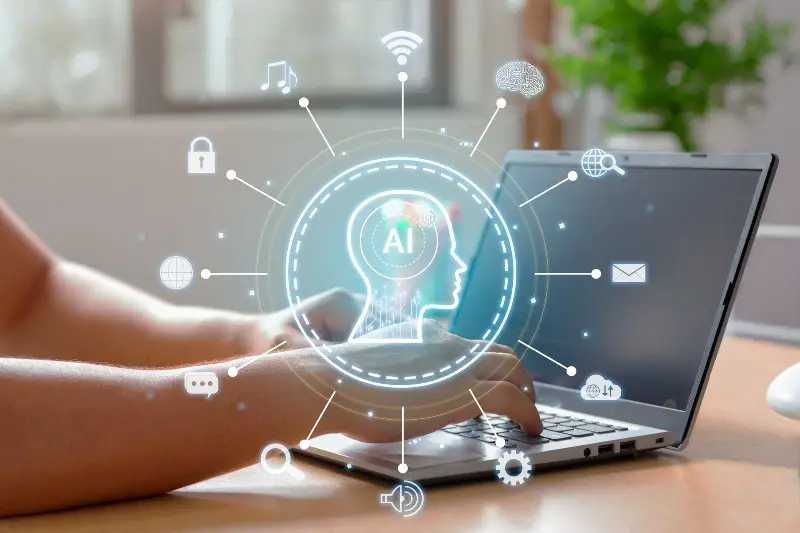Introduction
The past few decades have witnessed artificial intelligence (AI) infiltrating various aspects of our lives. While some of these changes have been subtle, others have resulted in seismic shifts in how we live, work, and even perceive the world. Perhaps nowhere is this transformation as palpable and as profoundly impactful as in the field of medicine and healthcare. This blog post aims to delve into the depths of this change, unearthing the profound ways in which AI is not just shaping, but revolutionizing the world of healthcare.
Healthcare, as an industry, has always been at the forefront of embracing new technology. But the arrival of AI has sent unprecedented ripples through the medical landscape. In an era where precision, personalization, and quick decision-making are paramount, AI’s potential to change the face of healthcare seems virtually limitless. From enhancing diagnoses to reshaping drug discovery, AI’s role in healthcare is fast becoming one of the most exciting arenas of modern technology application.
As we explore the intricate ways in which AI is revolutionizing healthcare, it’s important to remember that this journey is just beginning. While the progress made so far is undoubtedly promising, the horizon of AI’s potential in healthcare remains vast and largely uncharted. With this perspective in mind, let’s explore the role of AI in healthcare, one innovation at a time.
Defining the Role of AI in Modern Healthcare
Artificial intelligence, in the context of healthcare, involves the use of algorithms and software to approximate human cognition in the analysis of complex medical data. The primary aim of AI in healthcare is to analyze relationships between prevention or treatment techniques and patient outcomes.
AI has the potential to revolutionize many areas of healthcare ranging from patient care to research. AI-enabled chatbots, for instance, can take over many routine tasks such as booking appointments, reminding patients to take their medications, or even answering basic health inquiries. On the research front, AI can help analyze vast amounts of data, making it easier for researchers to identify trends or find new treatment methods.
How might AI-based tools impact the future job market for tax preparation professionals?
The Impact of AI on Medical Diagnosis
The application of AI in medical diagnosis has proven to be of immense value. Machine learning, a subset of AI, aids in predicting diseases by identifying patterns and features in massive datasets. Aided by complex algorithms, AI is being used to detect diseases such as cancer more accurately and in their early stages.
For instance, an AI system developed by Google’s DeepMind has demonstrated the ability to diagnose over 50 eye diseases as accurately as a human expert. In another example, an AI program named Paige.AI has been granted Breakthrough Designation by the US FDA for its ability to transform the clinical diagnosis and treatment of cancer.
AI in Drug Discovery and Development
The traditional drug discovery process, which involves the synthesis of new molecules and their testing in a series of pre-clinical and clinical stages, is costly and time-consuming. However, AI has the potential to significantly accelerate this process and make it more cost-effective.
Companies like Atomwise use AI algorithms for predicting which molecules are most likely to be effective as potential medications. Similarly, Insilico Medicine uses AI to design new molecules, test their efficacy, and check their toxicity, all within a matter of days. Through such approaches, AI is playing an instrumental role in transforming drug discovery and development.
Step into the fascinating world of the present, where artificial intelligence (AI) is not a distant dream, but a thrilling reality. Experience the seamless integration of AI in your everyday gadgets – your smartwatch, the intuitive smart speaker, the diligent security alarm, or the customer service chat box – all are manifestations of the awe-inspiring AI technology. Curious about the behind-the-scenes of AI creation? Pondering if AI is actually real? The enlightening ‘Artificial Intelligence For Dummies’ has all the answers you seek.
Commencing with a fundamental understanding of AI, this reference demystifies the intricate topic of AI for you. From the usage of data, algorithms, to the specialized hardware, the book is an easy-to-understand guide to the universe of AI that breathes life into the devices you simply can’t do without.
Here’s what the book promises to offer:
- Debunk the hyperbole surrounding artificial intelligence and get a true picture
- Delve into the astonishing capabilities of AI and learn about its boundaries
- Learn how AI accelerates data collection and analysis, enabling faster, informed decisions
- Explore how AI breathes life into hardware applications such as drones, robots, and vehicles
- Discover the potential applications of AI in diverse fields like space, medicine, and communication that are on the horizon
It’s worth noting that nearly 80% of the devices you interact with on a daily basis rely on some form of AI. While you don’t need to understand AI to use your smart speaker or engage with a bot, possessing knowledge about its inner workings will undoubtedly make you feel smarter. So, why wait? Grab this accessible guide today and unravel the captivating secrets of AI!
AI and Personalized Medicine: A New Era in Healthcare
AI’s role in ushering a new era of personalized medicine cannot be overstated. Personalized or precision medicine is a medical model that tailors healthcare, with medical decisions, practices, and treatments being customized to the individual patient. With the help of AI, we can analyze patient data and genetic information to understand the individual’s unique disease risk and response to medications.
Take, for instance, Tempus, a technology company that is harnessing AI to personalize cancer care. The company is using clinical and molecular data to help doctors make real-time, data-driven decisions. The predictive model provided by AI allows doctors to understand how a patient might respond to a particular treatment based on their genetic makeup, leading to more effective and individualized treatment plans.
Another example is Deep Genomics, a company using AI to build a new universe of genetic therapies. Their AI platform looks for patterns in vast amounts of genetic data to identify mutations that cause disease. The insights gained are then used to design therapies tailored to specific genetic profiles, revolutionizing the way we approach genetic diseases.
The Influence of AI on Mental Health Services
AI has a burgeoning role in mental health services, offering innovative solutions to some of the pressing challenges in this sector. From early detection of mental health issues to providing therapeutic services, AI is showing promise in improving mental health outcomes.
For instance, Quartet Health, a healthcare technology and services company, uses AI to identify patients who may have an undiagnosed mental health condition. The AI system looks for subtle patterns in a patient’s medical history that may indicate an underlying mental health condition.
Another pioneering application is the use of AI in therapeutic chatbots. Woebot, an AI-powered chatbot, uses principles of cognitive-behavioral therapy to interact with users, helping them manage symptoms of depression and anxiety. While these chatbots don’t replace traditional therapy, they offer a form of immediate, accessible support for those who may not otherwise seek help.
Conclusion
Artificial intelligence is revolutionizing the way we understand and approach healthcare. From predictive diagnostics to personalized treatment and improved patient care, the impact of AI in healthcare is profound and far-reaching.
However, the potential of AI does not negate the need for human expertise. The ultimate goal of AI in healthcare is not to replace the human touch but to augment it, empowering doctors with information to make better decisions and improving patient care.
Furthermore, the application of AI in healthcare also brings its share of challenges. Issues around data privacy, the need for diverse and representative data sets, and the ethical implications of AI decision-making are all valid concerns that need to be addressed as we move forward in this AI-driven healthcare era.
Yet, despite these challenges, the potential benefits of AI in healthcare are undeniable. The ability to analyze vast amounts of data for insights, make predictions, and learn from experience positions AI as a powerful tool in healthcare, capable of transforming lives and ushering in a new era of medical advancements.
In the end, the advent of AI in healthcare presents an exciting and promising future. As we continue to navigate this new frontier, the possibility of a world where disease can be detected earlier, treatments can be more personalized, and care can be more efficient and effective is becoming more tangible every day.

Navigating the Convergence: Artificial Intelligence and the Legal Sphere
Artificial Intelligence (AI) has transformed multiple sectors, including the field of law. This blog post delves into the legal aspects of AI, the regulatory landscape, and AI’s role in legal practice. It also explores AI’s impact on privacy law and the ethical quandaries it presents. A comprehensive look at the intriguing intersection of AI and law.





